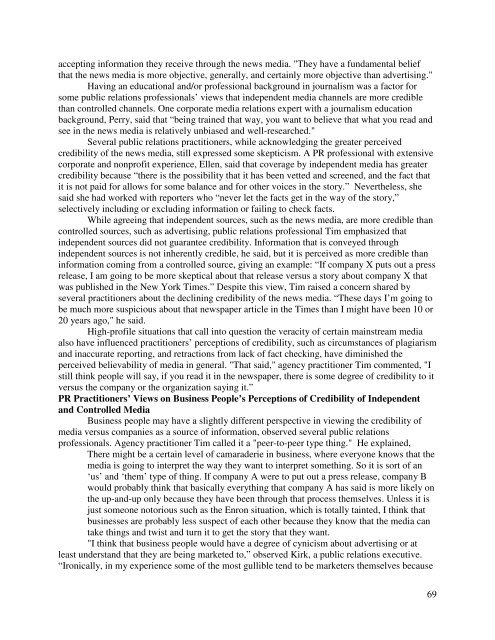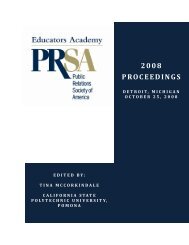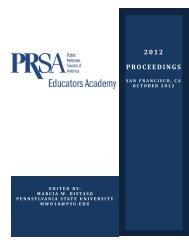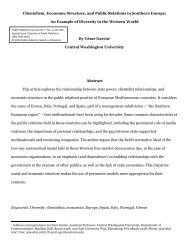2010 - Public Relations Society of America
2010 - Public Relations Society of America
2010 - Public Relations Society of America
You also want an ePaper? Increase the reach of your titles
YUMPU automatically turns print PDFs into web optimized ePapers that Google loves.
accepting information they receive through the news media. "They have a fundamental belief<br />
that the news media is more objective, generally, and certainly more objective than advertising."<br />
Having an educational and/or pr<strong>of</strong>essional background in journalism was a factor for<br />
some public relations pr<strong>of</strong>essionals’ views that independent media channels are more credible<br />
than controlled channels. One corporate media relations expert with a journalism education<br />
background, Perry, said that “being trained that way, you want to believe that what you read and<br />
see in the news media is relatively unbiased and well-researched."<br />
Several public relations practitioners, while acknowledging the greater perceived<br />
credibility <strong>of</strong> the news media, still expressed some skepticism. A PR pr<strong>of</strong>essional with extensive<br />
corporate and nonpr<strong>of</strong>it experience, Ellen, said that coverage by independent media has greater<br />
credibility because “there is the possibility that it has been vetted and screened, and the fact that<br />
it is not paid for allows for some balance and for other voices in the story.” Nevertheless, she<br />
said she had worked with reporters who “never let the facts get in the way <strong>of</strong> the story,”<br />
selectively including or excluding information or failing to check facts.<br />
While agreeing that independent sources, such as the news media, are more credible than<br />
controlled sources, such as advertising, public relations pr<strong>of</strong>essional Tim emphasized that<br />
independent sources did not guarantee credibility. Information that is conveyed through<br />
independent sources is not inherently credible, he said, but it is perceived as more credible than<br />
information coming from a controlled source, giving an example: “If company X puts out a press<br />
release, I am going to be more skeptical about that release versus a story about company X that<br />
was published in the New York Times.” Despite this view, Tim raised a concern shared by<br />
several practitioners about the declining credibility <strong>of</strong> the news media. “These days I’m going to<br />
be much more suspicious about that newspaper article in the Times than I might have been 10 or<br />
20 years ago," he said.<br />
High-pr<strong>of</strong>ile situations that call into question the veracity <strong>of</strong> certain mainstream media<br />
also have influenced practitioners’ perceptions <strong>of</strong> credibility, such as circumstances <strong>of</strong> plagiarism<br />
and inaccurate reporting, and retractions from lack <strong>of</strong> fact checking, have diminished the<br />
perceived believability <strong>of</strong> media in general. "That said," agency practitioner Tim commented, "I<br />
still think people will say, if you read it in the newspaper, there is some degree <strong>of</strong> credibility to it<br />
versus the company or the organization saying it.”<br />
PR Practitioners’ Views on Business People’s Perceptions <strong>of</strong> Credibility <strong>of</strong> Independent<br />
and Controlled Media<br />
Business people may have a slightly different perspective in viewing the credibility <strong>of</strong><br />
media versus companies as a source <strong>of</strong> information, observed several public relations<br />
pr<strong>of</strong>essionals. Agency practitioner Tim called it a "peer-to-peer type thing." He explained,<br />
There might be a certain level <strong>of</strong> camaraderie in business, where everyone knows that the<br />
media is going to interpret the way they want to interpret something. So it is sort <strong>of</strong> an<br />
‘us’ and ‘them’ type <strong>of</strong> thing. If company A were to put out a press release, company B<br />
would probably think that basically everything that company A has said is more likely on<br />
the up-and-up only because they have been through that process themselves. Unless it is<br />
just someone notorious such as the Enron situation, which is totally tainted, I think that<br />
businesses are probably less suspect <strong>of</strong> each other because they know that the media can<br />
take things and twist and turn it to get the story that they want.<br />
"I think that business people would have a degree <strong>of</strong> cynicism about advertising or at<br />
least understand that they are being marketed to,” observed Kirk, a public relations executive.<br />
“Ironically, in my experience some <strong>of</strong> the most gullible tend to be marketers themselves because<br />
69
















